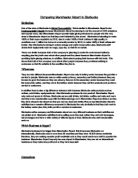Starbucks is a company that holds CSR as foundation to its’ objectives. This can be seen in the heading of its’ CSR Fiscal report which states, “Starbucks- a vision grounded in CSR”. Starbucks, a coffee chain first became a corporate socially responsible company in 1992, when Starbucks wrote its first CSR annual report to describe the positive impact they have made on society. Starbucks has a mission statement which consists of guidelines as follows:
• Provide a great work environment
and treat each other with respect
and dignity.
• Embrace diversity as an essential
component in the way we do business.
• Apply the highest standards of
excellence to the purchasing, roasting
and fresh delivery of our coffee.
• Develop enthusiastically satisfied
customers all of the time.
• Contribute positively to our
communities and our environment.
• Recognize that profitability is
essential to our future success.
These guidelines in themselves provide a clue as to the objectives of Starbucks, to make “profitability...essential”, as well serving the community in an ethical manner with guidelines to “Contribute positively to our communities and our environment” ; so, while serving the community, Starbucks PLC are practical in the fact that they know that after everything, the company will not run without capital, and they will only get that with shareholders’ investment; however they still keep in mind their Unique selling point, which is to serve the community through good community relations and helping the environment.
However this approach to keep the customers, employees and environmentalists happy can have many short term drawbacks. For e.g. paying the employees in accordance of their hard work is more expensive than to cut down on costs by paying employees wages just over the minimum wage. Starbucks do this as they do more for their farmers in Africa and Mexico than Faitrade (see source E) according to research firm thinktank. They also run many community events, which also takes money out of their capital, which in the short term may be seen to reduce profit.
Nike has become one of those global companies targeted by a broad range of campaigners and journalists as a symbolic representation of the business in society. In Nike’s case, the issues are those of human rights and conditions for workers in factories in developing countries. In the face of constant accusations, Nike has developed a considered response, supported by corporate website reporting. It now has a well developed focus for its corporate responsibility on improving conditions in contracted factories, aiming for carbon neutrality, and making sports available to young people across the world. The criticism continues, however.
Nike, in 1997 received a lot of negative publicity when they were blamed for keeping workers in dreadful conditions in so called sweatshops. This publicity dropped the sales by hge numbers as you can see from the graph below.
This is a graph from the Nike Fiscal report of 2001. This goes to show that Nike had been a non-CSR company in 1997, but they sold a lot of products, because the public was not aware of Nike’s stance on their suppliers having sweatshops. But when they did, sales nearly halved, showing that the public are looking to put pressure on non CSR businesses. This meant that Nike needed to address this issue of dropping sales, and the only way to do that had to be to rebrand and redeem itself for its mistakes. In its Fiscal report of 2001, Nike stated that “Nike suffered a blow to sales and revenue sparked by bad publicity in 1997 about our international labor policies. Since then, we have attempted to overcome the bad press by raising and enforcing minimum age requirements for employees in overseas factories”.
This shows that there are severe long term drawbacks for companies with non ethical guidelines, as Nike’s case study has shown. We can see that sales nearly halved, meaning customers started to lose trust in their products, which reduced income severely, as a result of the customers finding out about Nike’s non ethicality. Nike also had to spend hundreds of millions trying to rebrand itself as a people friendly company.
From rebranding itself as a CSR company Nike, and Starbucks now share many long term benefits such as better motivated workers as a result of higher pay, meaning higher production rates. The government also starts to help CSR companies to set a good example for other companies, and both other companies and the government can trust to do deals with them as they are both ethical companies.
It seems that having CSR as core to a company’s objectives boosts sales , and companies that rely on sales to the public especially need to improve their companies’ reputation as an ethical company. This is important because as the Nike and Starbucks case studies show, profit may be the ultimate aim, the short term objectives need to be based around CSR, as in the end that is what pleases most of the stakeholder, increasing production and sales.








